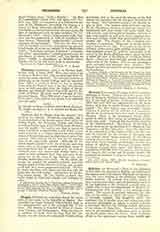

Chiabrera, GABRIELLO, poet, b. at Savona, Italy, June 8, 1552; d. there, 1638. When nine years of age he went to Rome to live with an uncle and there received his early education. He attended lectures on philosophy at the Jesuits’ College until his twentieth year. When a youth at Rome, he was on familiar terms with the learned men of the day, and favors came to him unsought from the Dukes of Savoy, Mantua, and Florence, Pope Urban VIII and the Republic of Genoa. He spent most of his time in Florence and Genoa. When fifty years of age he married. He is said to have written this distich to be inscribed over his tomb:
Amico,
Io vivendo cervava it conforto per lo Monte Parnasso.
Tu, meglio consigliato, fa di cercarlo sul Monte Calvario.
Chiabrera and G. Marini were the greatest lyric poets of the century. Chiabrera, especially, was a devoted student of the Greeks and is often called the Italian Pindar, but Anacreon, Aleseus, and Horace as well as Pindar, and, of the French poets, Ronsard, were his models. He used to say that he strove to follow Columbus in discovering a new world, a new world of poetry, as a reaction against the conventionalities of Petrarchism and the degenerated taste of the century. This reaction led the way for the classical lyric of the eighteenth century. Although he declared himself opposed to the use of rhyme, and even wrote some of his longer poems unrhymed, many of his poems show that he was master of it; he even introduced some new metres into Italian verse; he seems to have preferred short lines and some of his poems are in the form of the Pindaric ode, with strophe, antistrophe, and epode. On the whole, his poems are marked by splendid epithets, beautiful images, grace of form, richness of rhyme, yet, in spite of all that, they seem exaggerated and cold. All that he wrote was done with exactness, but it is only his lyrics that are read today. Less known are his five long heroic poems. He left, besides, a dozen dramatic works in verse and eulogies and dialogues in prose.
JOSEPH DUNN

